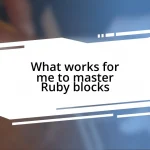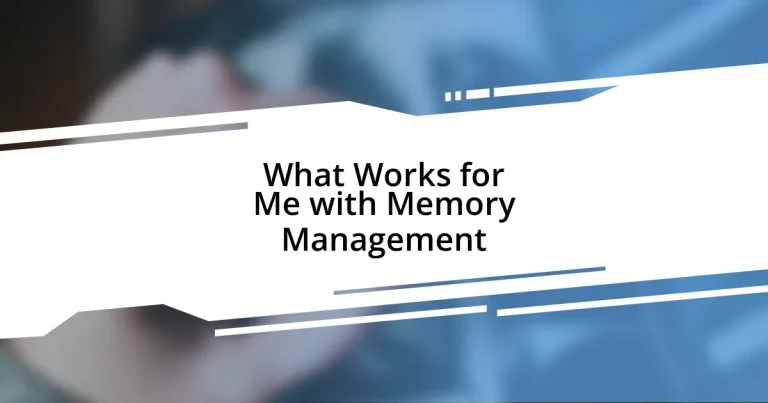Key takeaways:
- Effective memory management involves techniques like chunking, spaced repetition, and storytelling to enhance recall and retention.
- Utilizing digital tools such as note-taking apps and calendar applications can organize thoughts and improve study habits.
- Daily practices like mindfulness meditation, journaling, and regular exercise significantly boost memory and cognitive function.
- Regular evaluation and adaptation of memory techniques ensure they align with personal learning styles and preferences.
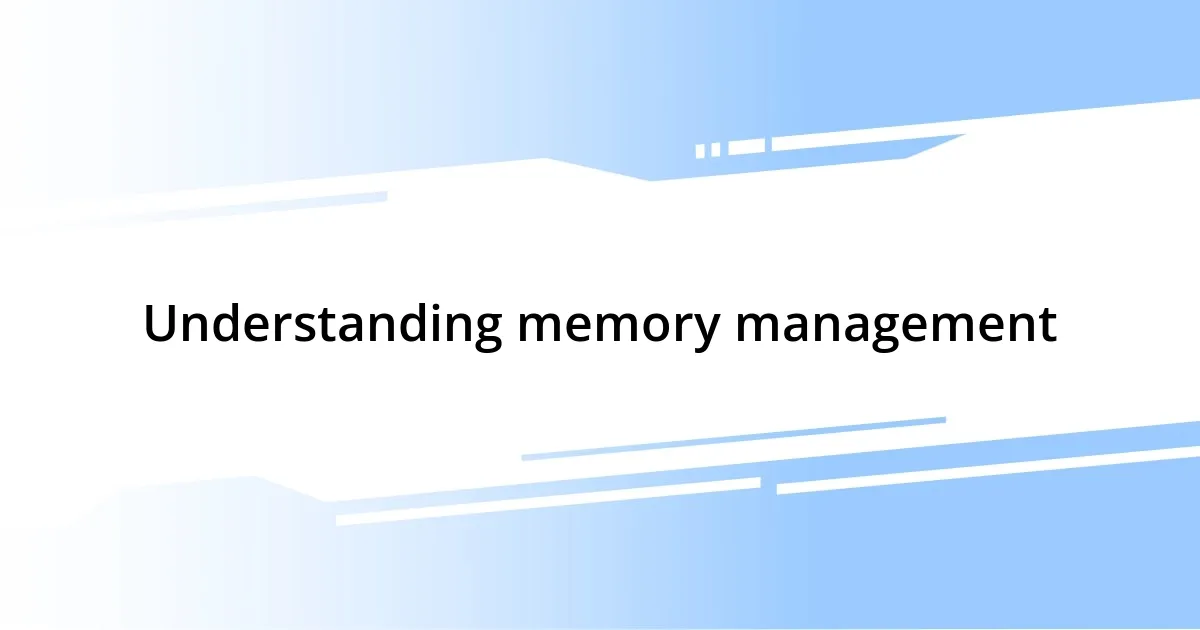
Understanding memory management
Understanding memory management is crucial for anyone looking to enhance their productivity and keep their mind sharp. I often find myself overwhelmed by the barrage of information we encounter daily — it can feel like my brain is a cluttered desk, full of stray papers and unfinished tasks. What if I told you that a little organization can transform that chaos into clarity?
When I first started paying attention to my memory habits, I realized how much of my mental load was unnecessary. For instance, I would often forget appointments or important details about projects. This led to stress and frustration. Can you relate to that feeling of forgetting something important just at the wrong moment? Taking a proactive approach to memory management not only alleviated that pressure for me, but it also allowed me to reclaim valuable time and mental space.
I’ve also found that different techniques work for different people, and that’s perfectly okay. For example, while some of my friends swear by elaborate note-taking systems, I usually stick to simple lists or visual aids. Exploring various strategies helps in discovering what feels right for you. Isn’t it fascinating how memory, though often taken for granted, can significantly impact our day-to-day lives? Engaging with memory management has truly changed my approach to daily challenges, making me more effective and less anxious.
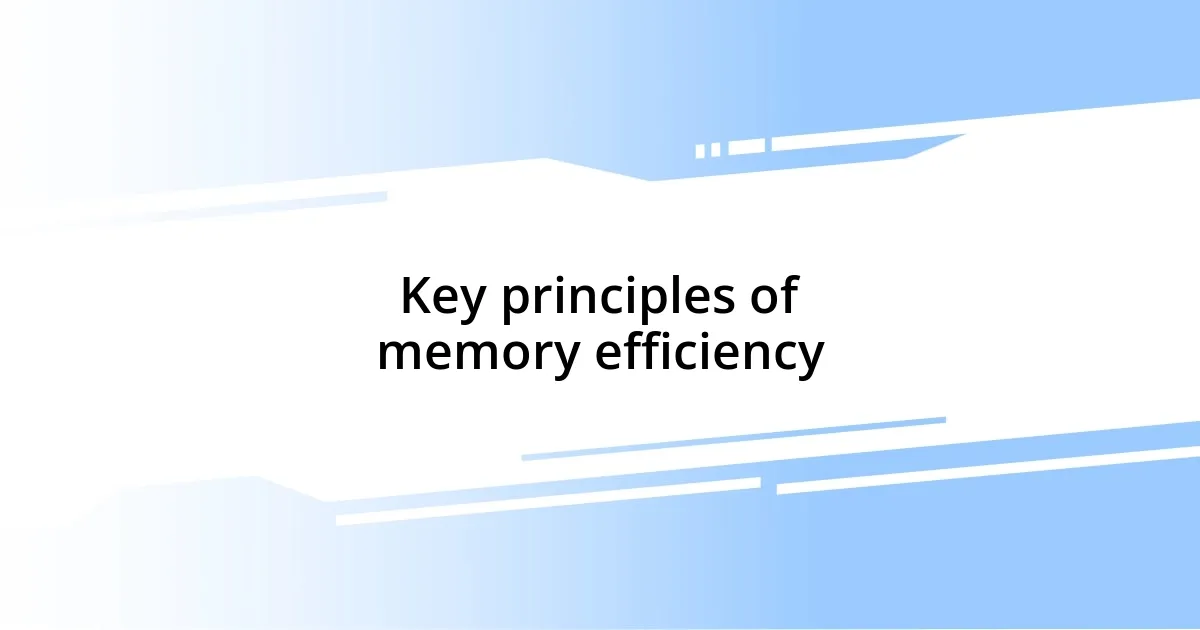
Key principles of memory efficiency
Effective memory management is all about honing in on strategies that resonate with me personally. One principle that I stand by is the power of chunking. This approach—breaking down large amounts of information into smaller, manageable pieces—helps me create mental pathways that are easier to remember. I recall studying for an exam, where instead of trying to memorize an entire chapter, I broke it down into key themes and memorized those first. It not only made studying less overwhelming but also allowed me to see connections between concepts more clearly.
Here are some key principles of memory efficiency that I’ve embraced:
- Chunking Information: Divide data into smaller, digestible units.
- Spaced Repetition: Review information at spaced intervals to enhance retention.
- Visual Imagery: Utilize images to create mental associations that stick.
- Mind Mapping: Illustrate connections between ideas for better understanding.
- Limit Information Intake: Focus on quality over quantity by filtering out unnecessary details.
Consistently applying these principles has transformed how I process information. For instance, during a particularly complex project at work, I learned to draw mind maps to visualize ideas. It was like flipping a switch; suddenly, I wasn’t just grasping individual points, but I was seeing the bigger picture. This method not only boosted my confidence but also made collaboration with my team more productive and engaging.
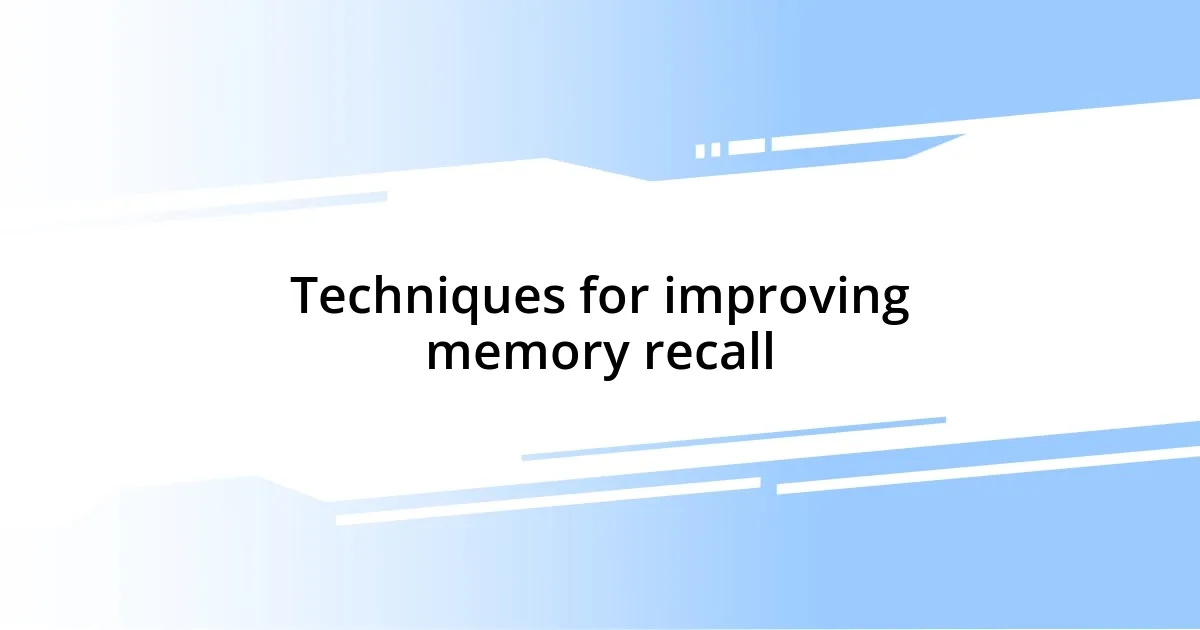
Techniques for improving memory recall
Improving memory recall is something I’m genuinely passionate about, and I’ve tried several techniques that really made a difference in my life. One method that I find particularly effective is associating new information with something familiar — it taps into my brain’s natural wiring. For instance, when I learned new vocabulary words in another language, I would attach them to images or experiences from my life. By converting abstract concepts into vivid memories, I found that these words stuck with me much better.
Another approach I embraced is the use of spaced repetition, which involves reviewing material at gradually increasing intervals. At first, I made flashcards and set reminders on my phone. Over time, I realized that this not only helped reinforce what I had learned but also made the process less daunting. I still remember how much less stress I felt before exams, knowing I had a solid plan to review instead of cramming everything in at once. Have you ever tried spreading out study sessions? If you haven’t, I highly recommend giving it a shot!
Then there’s the practice of storytelling. I often try to weave facts into a narrative or personal story when recalling information. The other day, I had to remember a series of steps for a new project at work. So, I crafted a little story in my head about each step being a character on a journey to success. This method made the details more relatable, and astonishingly, I remembered all the steps without any trouble. How about you? Do you find stories help you remember things better?
| Technique | Description |
|---|---|
| Association | Link new information to known concepts or personal experiences. |
| Spaced Repetition | Review material at increasing intervals to enhance long-term retention. |
| Storytelling | Embed information in a narrative for better memorization and recall. |
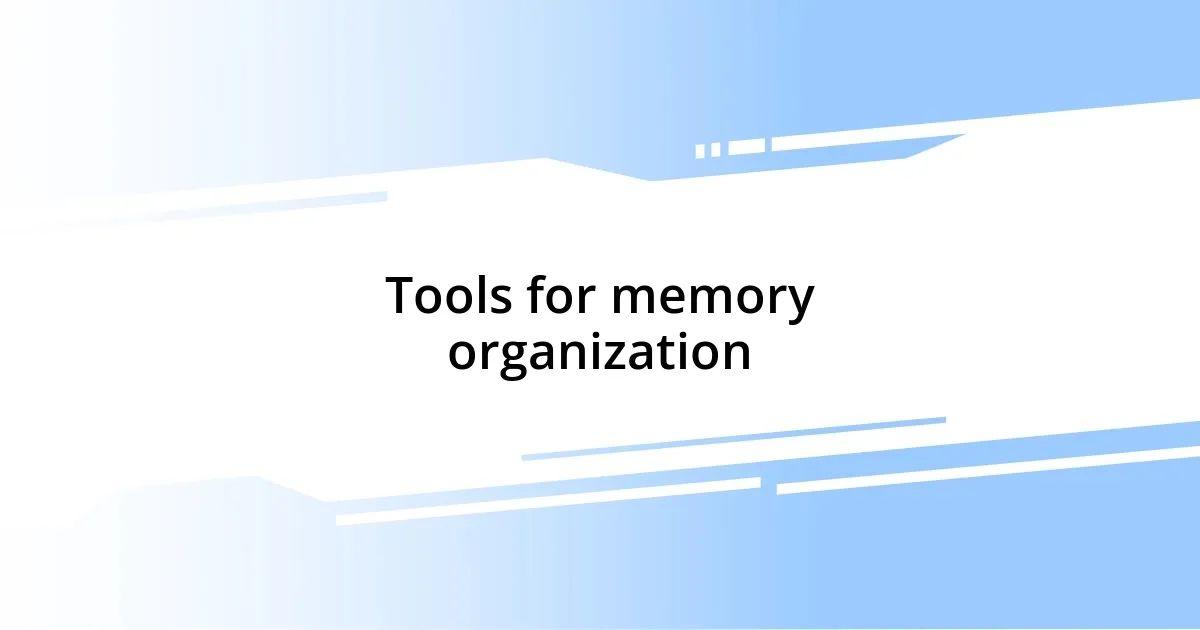
Tools for memory organization
When it comes to memory organization tools, I can’t emphasize the usefulness of digital note-taking apps enough. I often turn to applications like Evernote or Notion to capture my thoughts on the go. Just the other day, I was brainstorming ideas for a presentation, and instead of scribbling on random scraps of paper, I jotted everything down in an organized digital format. It’s fascinating how having everything in one place not only declutters my mind but also enhances my creativity!
Another powerful tool I’ve embraced is calendar applications for scheduling my study sessions. I’ve found that mapping out specific times for review not only keeps me accountable but also turns studying into a habit rather than a chore. When I first started using Google Calendar to block out time for learning new concepts, I noticed how much more I retained. Have you ever noticed the difference consistency makes in your memory processes?
Visualization tools like mind-mapping software have also been game changers for me. I vividly remember working on a team project where we utilized mind-mapping techniques to organize our thoughts. As everyone contributed, watching our ideas flow and connect visually made the brainstorming session incredibly dynamic and engaging. It’s remarkable how seeing information visually helps me grasp complex topics more easily—do you find that a visual approach resonates with you too?
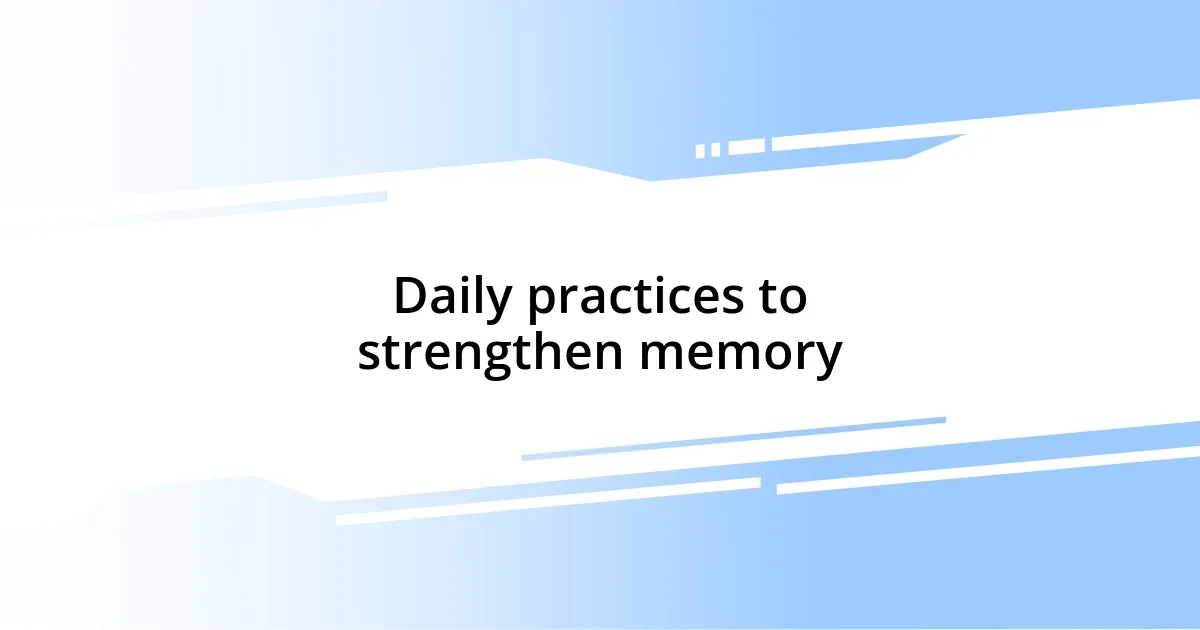
Daily practices to strengthen memory
One daily practice I’ve found immensely helpful is setting aside a few quiet minutes for mindfulness meditation. Just last week, I spent ten minutes focusing solely on my breath, and I noticed a remarkable improvement in my concentration throughout the day. Have you ever taken a moment to clear your mind like that? It’s during these pauses that I often find my memory sharpens, making room for new information to settle comfortably.
Another routine I follow is journaling every night before bed. This practice allows me to reflect on the day while reinforcing what I’ve learned. I remember feeling particularly proud last month when I noted down a conversation that helped me remember key insights about a project I was working on. It’s fascinating how writing things down not only serves as a record but also solidifies those memories in my mind. Have you ever tried journaling? It can be a surprisingly powerful tool for memory enhancement.
Regular physical exercise has also become a key player in my memory management toolkit. I’ve noticed that after a brisk walk or a workout, my mind feels clearer. Just the other day, I went for a run before studying, and I couldn’t believe how quickly I grasped new concepts. It seems that the connection between movement and cognitive function is truly alive! Do you feel more mentally sharp after physical activity too?

Evaluating your memory techniques
Evaluating your memory techniques is essential to understanding what truly works for you. I often think about the last time I tried a new memorization strategy. It turned out to be a missed opportunity because I didn’t consistently reflect on its effectiveness. Have you felt that frustration when a technique just doesn’t click? Taking the time to evaluate can help avoid that.
One method I’ve found beneficial is keeping a simple log of my memory practices. After trying a new technique for a few weeks, I jot down observations about what worked and what didn’t. Recently, I experimented with a new visualization method during my study sessions. Initially, I felt a bit overwhelmed, but by revisiting my notes, I could see clear patterns in my retention rates. Reflecting this way has been a game changer—how do you assess your progress?
Additionally, I’ve learned to trust my instincts. If something doesn’t resonate with me, it’s okay to pivot. I remember a particularly dense subject where traditional rote memorization was more exhausting than productive. When I shifted to storytelling to engage with the material, I felt a lift in my ability to recall critical details. It reminds me that memory techniques should align with who we are as learners. What methods do you cherish, and how do they reflect your unique learning style?
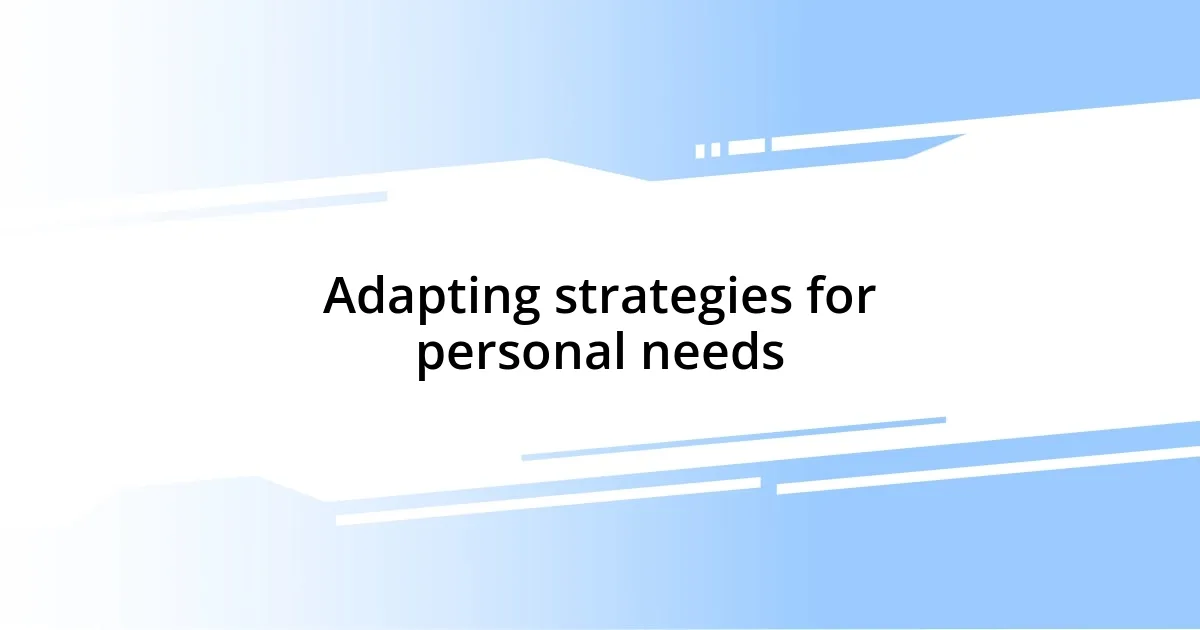
Adapting strategies for personal needs
Adapting memory strategies to align with my personal needs has proven invaluable. For instance, I noticed that auditory learning works wonders for me. When I first started using voice memos to record important concepts, it opened a new world. Listening to my own voice, inflection, and tone helped solidify the information in my mind. Have you ever tried verbalizing your thoughts? It can be a game changer!
Another adaptation I embraced was creating visual aids tailored to my learning preferences. I vividly recall crafting a colorful mind map for a challenging course. The act of organizing information visually not only made it more engaging but also allowed me to see relationships between concepts. When I finished, that map felt like a trophy of effort and creativity. What about you? Have you ever harnessed your artistic side to bolster your memory?
Finally, I’ve found that adjusting my environment contributes to memory retention. I learned this when I struggled to study in noisy spaces. By transforming a quiet corner in my home into a cozy study nook, I noticed that I absorbed information so much better. The atmosphere became soothing, and it helped me connect with my materials more deeply. What changes could you make in your environment to better support your memory journey?

